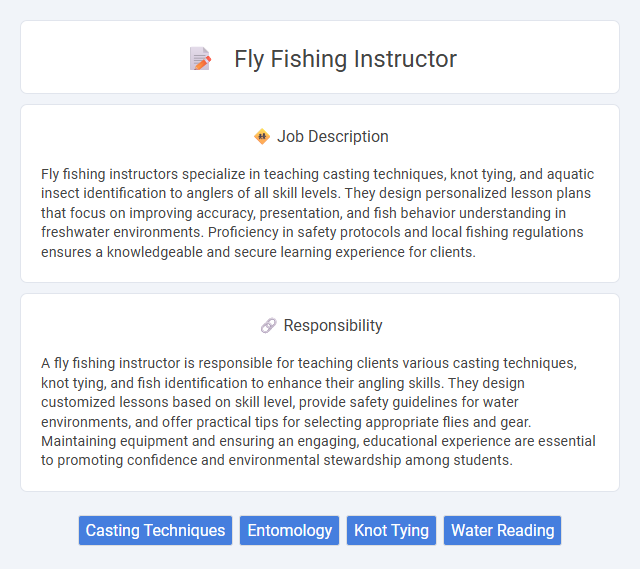
Fly fishing instructors specialize in teaching casting techniques, knot tying, and aquatic insect identification to anglers of all skill levels. They design personalized lesson plans that focus on improving accuracy, presentation, and fish behavior understanding in freshwater environments. Proficiency in safety protocols and local fishing regulations ensures a knowledgeable and secure learning experience for clients.
Individuals with patience, a love for nature, and strong communication skills are likely suitable for a fly fishing instructor role. Those who enjoy teaching and can adapt to varying outdoor conditions may find this job fulfilling. Candidates uncomfortable with unpredictable weather or repetitive instruction might face challenges in this position.
Qualification
A Fly Fishing Instructor must possess extensive knowledge of aquatic ecosystems, fish behavior, and fly casting techniques, typically supported by certifications such as the Federation of Fly Fishers (FFF) Casting Instructor or equivalent. Proficiency in teaching diverse skill levels, coupled with strong communication and safety management skills, is essential for effective instruction. Experience in guiding fishing trips and understanding local fishing regulations enhances the instructor's ability to deliver practical and engaging lessons.
Responsibility
A fly fishing instructor is responsible for teaching clients various casting techniques, knot tying, and fish identification to enhance their angling skills. They design customized lessons based on skill level, provide safety guidelines for water environments, and offer practical tips for selecting appropriate flies and gear. Maintaining equipment and ensuring an engaging, educational experience are essential to promoting confidence and environmental stewardship among students.
Benefit
Fly fishing instructor jobs likely offer benefits such as flexible outdoor work environments that promote physical activity and mental relaxation. They may provide opportunities for skill development in specialized fishing techniques and customer interaction, enhancing professional growth. There is also a probable chance of earning supplemental income through guided tours, workshops, and personalized lessons.
Challenge
The role of a fly fishing instructor likely involves the challenge of adapting teaching techniques to diverse skill levels and varying learning styles. It may require patience and problem-solving to help students master complex casting methods and understand aquatic ecosystems. Overcoming unpredictable environmental conditions could also be a common challenge, demanding flexibility and resilience.
Career Advancement
A fly fishing instructor can advance their career by gaining specialized certifications such as the Federation of Fly Fishers (FFF) Instructor program and pursuing opportunities to lead guided trips and workshops. Building a strong industry network and developing skills in gear technology and aquatic entomology enhance professional credibility and open doors to consultancy or product development roles. Mastery in digital marketing and content creation enables expansion into online coaching and educational platforms, further increasing career growth potential.
Key Terms
Casting Techniques
Mastering casting techniques is essential for a fly fishing instructor to effectively teach students accurate rod handling, line control, and presentation. Expertise in various casts such as the overhead, roll, and double haul enables instructors to adapt lessons to different water conditions and target species. Clear communication of timing, anchor spots, and line trajectory helps learners develop precision and confidence in their fly fishing skills.
Entomology
A fly fishing instructor specializing in entomology provides expertise on aquatic insect identification, life cycles, and behavior to enhance angler success. Deep knowledge of mayflies, caddisflies, and stoneflies enables the instructor to teach accurate fly tying and presentation techniques that imitate natural prey. This scientific approach improves fishing strategies by aligning fly patterns with seasonal hatch variations and insect availability.
Knot Tying
Mastering knot tying is an essential skill for a fly fishing instructor, ensuring clients can securely attach flies, leaders, and tippets for optimal fishing performance. Expertise in knots such as the improved clinch, blood, and surgeon's knot is critical for teaching proper techniques and enhancing fish landing success. Instruction on knot tying improves overall angling efficiency and safety by preventing line slippage and breakage under tension.
Water Reading
Expertise in water reading is essential for a Fly Fishing Instructor to accurately identify fish habitats and optimize casting techniques. Mastery of interpreting water flow, currents, and underwater structures enhances the ability to teach clients effective fly placement and presentation. Proficiency in water reading directly increases catch success and elevates the overall fishing experience.
 kuljobs.com
kuljobs.com